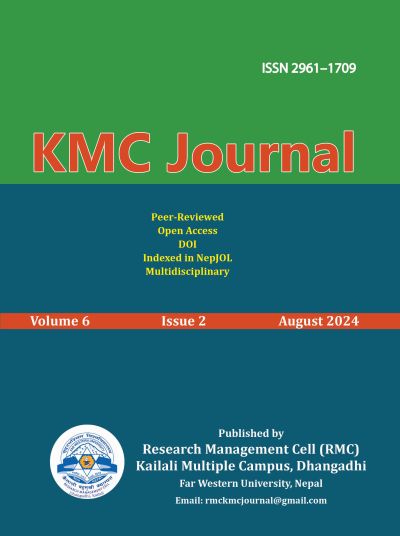The Good Muslim as a Quest for Jus Post Bellum in a Nation in Transition
DOI:
https://doi.org/10.3126/kmcj.v6i2.68890Keywords:
Jus post bellum, citizen’s trial, democracy, struggle, meionexiaAbstract
This paper explores the search for justice after the war in Tahmima Anam’s novel, The Good Muslim. The novel deals with the aftermath of ‘the Liberation War of Bangladesh’ in the 1970s and early 80s, when the country was gravely suffering from famine, consecutive murders of their prominent leaders, political upheavals, natural disasters, and paralyzed democratic norms in the hands of a Dictator Hussein Muhammad Ershad. In such a context, Maya Haque, the protagonist of the novel, and an erstwhile freedom fighter continues writing and fighting for modern education, justice for the rape victims of the war, and democracy in the country. The study analyzes narrative data from the novel to see how the female characters struggle for justice after the war. For this purpose, it uses Larry May’s insights on ‘jus post bellum’. May has proposed six criteria for post-war justice, including ‘reconciliation’ and ‘rebuilding’, to maintain lasting peace in a post-war society. The novel entails these conditions and brings transitional justice to the fore of discourse through the literary creation. The paper claims that the protagonist is not only raising her voice for certain characters in the novel, rather she is constantly contributing to the broader issue of jus post bellum, which has been the most important, yet the most ‘neglected’ topic in just war theories. The article concludes with the idea that a fictitious work like The Good Muslim can be a good voice for the voiceless and a loud and clear advocacy for justice after the war. It can contribute to maintaining law and order and build up lasting peace preventing further violence in a postwar society.
Downloads
Downloads
Published
How to Cite
Issue
Section
License

This work is licensed under a Creative Commons Attribution-NonCommercial 4.0 International License.
This license allows reusers to distribute, remix, adapt, and build upon the material in any medium or format for noncommercial purposes only, and only so long as attribution is given to the creator.




